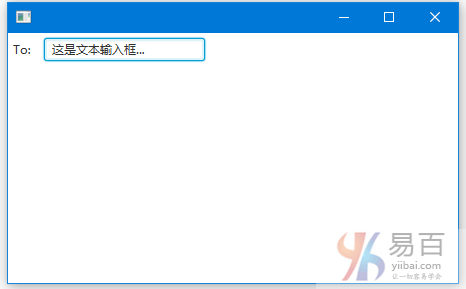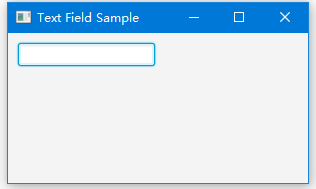JavaFX文本域(輸入框)
TextField用於單行文本輸入。請看下面的示例 -
import javafx.application.Application;
import javafx.geometry.Insets;
import javafx.scene.Group;
import javafx.scene.Scene;
import javafx.scene.control.Label;
import javafx.scene.control.TextField;
import javafx.scene.layout.GridPane;
import javafx.stage.Stage;
// at W w w .1ju.org
public class Main extends Application {
public static void main(String[] args) {
launch(args);
}
@Override
public void start(Stage stage) {
Scene scene = new Scene(new Group(), 450, 250);
TextField notification = new TextField ();
notification.setText("Label");
notification.clear();
GridPane grid = new GridPane();
grid.setVgap(4);
grid.setHgap(10);
grid.setPadding(new Insets(5, 5, 5, 5));
grid.add(new Label("To: "), 0, 0);
grid.add(notification, 1, 0);
Group root = (Group) scene.getRoot();
root.getChildren().add(grid);
stage.setScene(scene);
stage.show();
}
}TextField和Password字段擴展了TextInput類,它是JavaFX中所有文本控件的超類。
上面的代碼生成以下結果。

創建文本域
我們可以使用TextField類的構造函數來創建文本字段。
TextField只是一個帶有光標的文本輸入框,通常我們需要一個Label控件來告訴文本字段的目的。以下代碼創建一個Label控件來標記對應的文本字段是用於名稱輸入。然後它創建一個TextField對象。之後,它使用HBox佈局Label和TextField。
Label label1 = new Label("Name:");
TextField textField = new TextField ();
HBox hb = new HBox();
hb.getChildren().addAll(label1, textField);
hb.setSpacing(10);使用預定義文本創建文本字段。
TextField textField = new TextField("1ju.org")TextField文本
要從文本字段獲取值,請調用getText()方法。
從TextInput的setPrefColumnCount方法設置文本字段的大小。 通過設置一次可以顯示的最大字符數。
我們可以使用提示字幕通知用戶文本字段的用途。setPromptText()方法定義顯示在文本字段中的字符串。無法通過getText()方法獲取提示文本。
以下代碼顯示如何設置TextField的提示文本
import javafx.application.Application;
import javafx.geometry.Insets;
import javafx.scene.Group;
import javafx.scene.Scene;
import javafx.scene.control.TextField;
import javafx.scene.layout.GridPane;
import javafx.stage.Stage;
// by w W w. 1ju .org
public class Main extends Application {
@Override
public void start(Stage stage) {
Group root = new Group();
Scene scene = new Scene(root, 300, 150);
stage.setScene(scene);
stage.setTitle("Text Field Sample");
GridPane grid = new GridPane();
grid.setPadding(new Insets(10, 10, 10, 10));
grid.setVgap(5);
grid.setHgap(5);
scene.setRoot(grid);
final TextField name = new TextField();
name.setPromptText("Enter your first name.");
name.setPrefColumnCount(10);
name.getText();
GridPane.setConstraints(name, 0, 0);
grid.getChildren().add(name);
stage.show();
}
public static void main(String[] args) {
launch(args);
}
}以下列表有一些有用的方法,可以使用它們在文本字段中進行文本編輯。
-
copy()- 將所選文本設置爲剪貼板。 -
cut()- 將所選文本設置爲剪貼板並刪除當前選擇。 -
selectAll()- 選擇文本輸入中的所有文本。 -
paste()- 將剪貼板中的內容設置爲此文本並替換當前選擇。
上面的代碼生成以下結果。

示例-1
以下代碼顯示如何將字符串值從TextField綁定到Stage Title。
import javafx.application.Application;
import javafx.beans.property.SimpleStringProperty;
import javafx.beans.property.StringProperty;
import javafx.scene.Scene;
import javafx.scene.control.Label;
import javafx.scene.control.TextField;
import javafx.scene.layout.HBox;
import javafx.stage.Stage;
public class Main extends Application {
StringProperty title = new SimpleStringProperty();
public static void main(String[] args) {
Application.launch(args);
}
@Override
public void start(Stage stage) {
TextField titleTextField;
titleTextField = new TextField();
titleTextField.setText("Stage Coach");
titleTextField.setPrefColumnCount(15);
HBox hBox = new HBox();
hBox.setSpacing(10);
hBox.getChildren().add(new Label("title:"));
hBox.getChildren().add(titleTextField);
Scene scene = new Scene(hBox,270,270);
title.bind(titleTextField.textProperty());
stage.setScene(scene);
stage.titleProperty().bind(title);
stage.show();
}
}上面的代碼生成以下結果。

實例-2
以下代碼顯示瞭如何將ContextMenu添加到TextField。
import javafx.application.Application;
import javafx.event.ActionEvent;
import javafx.event.EventHandler;
import javafx.geometry.Insets;
import javafx.scene.Group;
import javafx.scene.Scene;
import javafx.scene.control.ContextMenu;
import javafx.scene.control.Label;
import javafx.scene.control.MenuItem;
import javafx.scene.control.TextField;
import javafx.scene.layout.GridPane;
import javafx.stage.Stage;
import javafx.stage.WindowEvent;
public class Main extends Application {
public static void main(String[] args) {
launch(args);
}
@Override
public void start(Stage stage) {
Scene scene = new Scene(new Group(), 450, 250);
TextField notification = new TextField();
final ContextMenu contextMenu = new ContextMenu();
contextMenu.setOnShowing(new EventHandler<WindowEvent>() {
public void handle(WindowEvent e) {
System.out.println("showing");
}
});
contextMenu.setOnShown(new EventHandler<WindowEvent>() {
public void handle(WindowEvent e) {
System.out.println("shown");
}
});
MenuItem item1 = new MenuItem("About");
item1.setOnAction(new EventHandler<ActionEvent>() {
public void handle(ActionEvent e) {
System.out.println("About");
}
});
MenuItem item2 = new MenuItem("Preferences");
item2.setOnAction(new EventHandler<ActionEvent>() {
public void handle(ActionEvent e) {
System.out.println("Preferences");
}
});
contextMenu.getItems().addAll(item1, item2);
notification.setContextMenu(contextMenu);
GridPane grid = new GridPane();
grid.setVgap(4);
grid.setHgap(10);
grid.setPadding(new Insets(5, 5, 5, 5));
grid.add(new Label("To: "), 0, 0);
grid.add(notification, 1, 0);
Group root = (Group) scene.getRoot();
root.getChildren().add(grid);
stage.setScene(scene);
stage.show();
}
}上面的代碼生成以下結果。

實例-3
覆蓋replaceText和replaceSelection以創建自定義的TextField,如下所示 -
import javafx.application.Application;
import javafx.scene.Group;
import javafx.scene.Scene;
import javafx.scene.control.TextField;
import javafx.scene.paint.Color;
import javafx.stage.Stage;
public class Main extends Application {
public static void main(String[] args) {
Application.launch(args);
}
@Override
public void start(Stage primaryStage) {
Group root = new Group();
Scene scene = new Scene(root, 300, 250, Color.WHITE);
TextField field = new TextField() {
@Override
public void replaceText(int start, int end, String text) {
if (!text.matches("[a-z]")) {
super.replaceText(start, end, text);
}
}
@Override
public void replaceSelection(String text) {
if (!text.matches("[a-z]")) {
super.replaceSelection(text);
}
}
};
root.getChildren().add(field);
primaryStage.setScene(scene);
primaryStage.show();
}
}上面的代碼生成以下結果,只能輸入數字值 -
